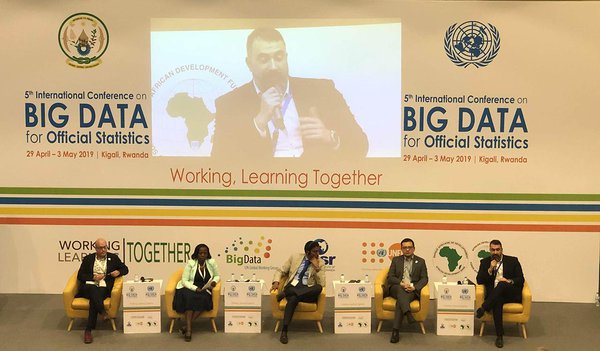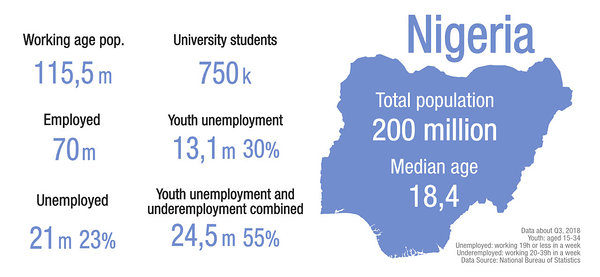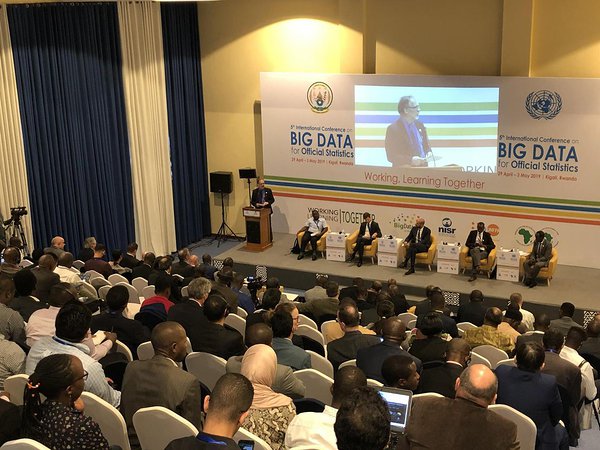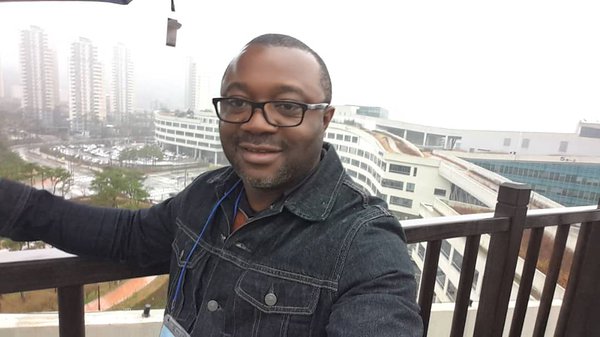With a vast number of mobile connections, Nigeria is ready to tap into big data analytics to support decision-making. Signifying their dedication, the Nigerian National Technical Working Group was inaugurated on 8 May, 2019 to explore the applicability of big data solutions to overcome the country's societal challenges.
Bernard Ewah is the President of Keoun Technologies Limited and the Programme Consultant for the National Technical Working Group in Nigeria. We had an interesting discussion with him about the current state of big data in Nigeria.
Could mobile positioning data offer the unique opportunity Nigeria needs?
What brings you here to the UN Big Data Conference, what's your relationship with big data?
Bernard: Big data offers a unique opportunity for my country, Nigeria, to work on a number of challenges. The UN Conference on Big Data is another opportunity to learn and be able to get good ideas on how to design and implement a strategy for utilising the unique opportunities offered by data analytics.
For about three years now I have been engaging institutions across Nigeria on how we could take advantage of Nigeria's unique position in terms of the availability of a huge number of mobile connections, to turn it into a further advantage by providing opportunities for government officials to make better decisions that would not only result in enhanced productivity but also lead to reduced costs.
What is the current situation in Nigeria with regards to that?
Bernard: Evidently, we have one of the youngest populations in the world, but on the other hand we have recorded some of the highest youth unemployment rates as well. It's a conundrum that needs to be addressed because it presents a ticking time bomb. Secondly, there are a lot of leakages in the government system. The former British Prime Minister, David Cameron, said that Nigeria was fantastically corrupt. The current system lacks controls. The system is so big it results in less trust in governmental decisions. These are a few of the reasons why I think that Nigeria particularly could benefit from improved processes that allow more evidence-based decisions across different areas of government bureaucracy.
What is the possible future for the use of data in Nigeria?
Bernard: In the last few months, our government has shown increased interest in big data, which is very important. In 2017, the key government agencies responsible for IT regulation held a workshop designed to foster the interest of stakeholders and sensitise them to the use of mobile positioning data. That workshop was well attended – it drew participants from across the broad spectrum of the government, including the military. So now we are moving ahead in the Federal Ministry of Communications, which is the apex policy-making organisation in the technology sector. The ministry has set up a technical working group which is going to result in sustainable strategies and frameworks that will enable us to serve the country, to institute processes that would be binding for all the stakeholders.
Secondly, the government has approved a pilot project which would allow the use of mobile positioning data generated by telcos (telecommunications companies) in the Federal Capital Territory for it to be processed as a proof of concept for Nigeria. I think that before the end of the year we, together with the technical working group, are going to have evidence that would provide us with factors that would be convincing to the stakeholders. And that would also put us on the trajectory where we can begin to look towards creating a platform for the continuous production of studies.
That sounds great! What kind of support do you have from the government to make this work?
Bernard: The government is making budgetary provisions for that by sponsoring the pilot project, which is going to kick off within this May. The government is also creating a forum for enhancing the understanding of potential uses of mobile positioning data, as well as creating the necessary policy and regulatory instruments. We think that there is a very strong desire from the government to explore these opportunities.
One of the things that we will continue to expect from the government is the consistent sensitisation of its institutions because we expect some form of resistance – which is natural. The government has a responsibility to open its institutions to the benefits that are derived from the use of this data, for improving its processes, for transforming existing processes or encouraging the institutions to embrace analytics as part of their business strategy. There is discussion about crafting national data strategies that would be all-encompassing, that look beyond mobile positioning data, but address the vision of making data an integral part of the government.
If we think about mobile positioning data, you will of course need to involve mobile network operators. What kind of cooperation do you have with them?
Bernard: My company, Keoun, has established cooperation with some of the leading operators in Nigeria. Now, what's interesting is that the operators find the idea quite novel and promising because, for one, they have the opportunity to give back to their societies by supplying the resources that could not just improve the governance processes but ultimately contribute to the quality of life of Nigerians. It's a win-win for the operators in terms of value and social contribution.
What do you expect from this conference?
Bernard: The conference has been very educative. At the
same time, I have found a lot of “co-travellers”, people who I can learn from. There’s
been a lot of discussions about the need for greater collaboration, which I
quite understand because what we are trying to achieve in Nigeria is not new to
us. Some of the other countries have had real-life experience with the use of
this data. The UN Global Working Group –
consider it a very strategic platform to which I've already shown my support.
I'm going to utilise all the resources at their disposal to enhance what we are
trying to achieve in Nigeria.
How do you think companies like Positium could help you in your journey?
Bernard: Positium as one of the early practitioners in
the industry would be of extreme importance to us in Nigeria, and we will
continue to count on the relationship that we have with Positium to steer not
just the confidence of governments in the use of these technologies but also to
achieve even earlier results. We think that we have a bright future ahead. We
hope that we can continue to count on the experience of Positium in addressing
or overcoming the challenges and the expectations that we have identified.
Bernard Ewah is the President of Keoun Technologies Limited. Keoun Technologies Limited is a pioneer company that is promoting the use of mobile positioning data in Nigeria. Keoun has been in technical cooperation with Positium since 2017. The company also works with key government institutions, currently consulting the Federal Ministry of Communications. They are going to be implementing pilot projects for the Ministry of Communications and are also a member of the National Technical Working Group on mobile data, which was inaugurated on 8 May, 2019 has the following sub-groups: Data Applicability, Policy and Regulations, Infrastructure and Commercial Models and lastly, Capacity Building and Sensitization.
.png)




-1_block.png)